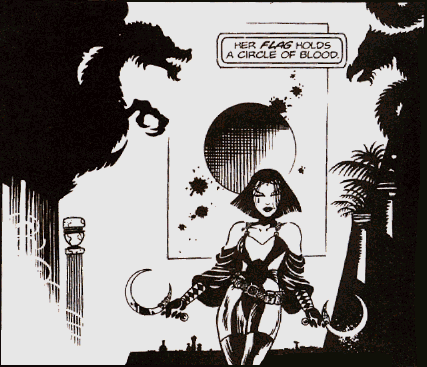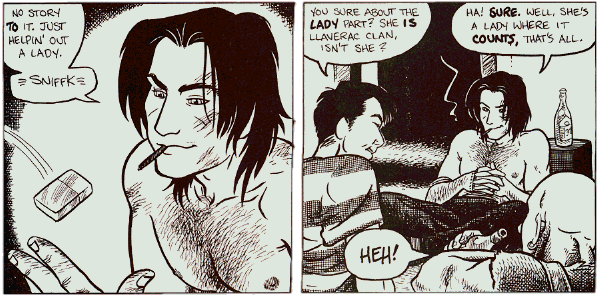

| August 2001 |
|
| David Mack: Kabuki | |
 Her backstory takes up most of the first volume. She is the daughter, by rape, of an Ainu forced to work as a 'comfort woman' during WWII... this would put her in her late '50s, at least, but Mack needs a little compression of history to make his themes work, and who can begrudge him that? The rapist, Kai, is now a crimelord, and the Noh get the paradoxical order to eliminate Kai's rivals; the resulting freedom of action will lead to his downfall (at least, if the Noh has been reading Sun Tzu correctly).
Her backstory takes up most of the first volume. She is the daughter, by rape, of an Ainu forced to work as a 'comfort woman' during WWII... this would put her in her late '50s, at least, but Mack needs a little compression of history to make his themes work, and who can begrudge him that? The rapist, Kai, is now a crimelord, and the Noh get the paradoxical order to eliminate Kai's rivals; the resulting freedom of action will lead to his downfall (at least, if the Noh has been reading Sun Tzu correctly).
Mack is obviously fascinated by Japanese culture (and likes to draw sexy Japanese girls); but his view is not entirely admiring: his focus is on the dark side of Japanese history-- their treatment of the Ainu, their brutal rampage through Asia, their corruption. (Could this be because his girlfriend is Taiwanese?)
The art is spectacular-- going well beyond illustration into expressionism, references, games of symbolism and visual rhymes. (The one influence that seems to be missing is manga. Mack quotes any number of classical Asian motifs, but his girls are nothing like those cylindrical babyfaces... they're more reminiscent of American superhero comics-- of the early '80s, perhaps, before every woman had to have Lara Croft breasts.)
The writing is careful, and often poetic. The character of Kai is perhaps the most interesting-- though I'm not sure it holds together; the sociopathic monster described in flashbacks doesn't quite fit with the educated and rather charming man we eventually meet. (When his anti-Ainu racism eventually comes out, it doesn't have the shock of breaking through an urbane exterior; it just seems melodramatic.) Kabuki herself is intriguing, but I'm waiting for the second volume to see what Mack makes of her; here she doesn't get much beyond her own story of generational humiliation and revenge.
And speaking of generations, it's interesting to follow the slow changes in the depiction of women in adventure stories. A century ago, they hardly belonged in adventure; indeed, Tom Sawyer, Sherlock Holmes, Little Nemo, or Tintin could largely be described as a flight from women, whose civilizing influence was precisely what made adventure impossible at home. Later we get spunky girls, as in the Narnia books-- more sensible than the boys, perhaps, but a good deal less dangerous. And later still we have a veritable population explosion of strong, violent heroines, any one of which can eviscerate a malefactor with her bare hands, and yet still takes the time to dress in skin-tight uniforms.
In the classic adventure story, such as the Iliad or Touch of Evil or Popeye, the ultimate threat the heroine faces is rape. One can hardly blame storytellers for terrifying us with the terrible; but it is somewhat limiting. Male heroes can face many other perils: starvation (Robinson Crusoe), exile (Gulliver, Odysseus), revenge (Inigo Montoya, Batman, Lone Wolf), political persecution (The Three Musketeers; Maus; the X-Men), powerlessness and anomie (Cerebus, Hamlet), rotten luck (most anything by Hitchcock).
Update: Further thoughts after reading five more volumes.
The motor of Kabuki is rape (and if that weren't enough, mutilation). The theme is brought up to date by making Kabuki a lethal female assassin; but I can't help thinking that the theme and the treatment (responding to an act of violence with greater violence) are highly male. Which makes it worthwhile to compare it to--
| Carla Speed McNeil : Finder | |
Emma turns out to have a problem: her abusive ex-husband, Brigham. Years ago, he moved his family to a remote army post, and kept restricting their freedom, till they were locked up in a cellar... finally Emma escaped with the children, and Brig was thrown in jail. Only now he's out.

Anvard is a grab-bag of cultural quotations and inventions, making up a fascinating and extremely weird society. The Church of Huitzilipochtli, marketing movies of death and destruction for spiritual reasons... the Nyima, whose women are lion-headed and whose men are more or less lions... the oracle at the Museum of Pain... Jaeger's other job, Sin-Eater, a sort of professional scapegoat... plus scores of affectionate nods to other comics. You can find Max in vol. 1, p. 8; Action Girl, Death, and Kitsune on p. 70; Alison Bechdel's Lois in vol. 2, p. 43...
In case you miss anything, McNeil provides an appendix with notes, such as this one: "Note the large feathery dinosaur. This is a male Laeske in last year's breeding plumage. His long feathers mean he was successful in his courtship. All males who don't breed shed their fancy feathers at the end of breeding season." This has nothing to do with the plot; it's like McNeil just can't help herself from filling in all this detail. (A woman after my own heart.) The only similar thing I know of in comics is François Bourgeon's Cyann.
McNeil also takes time out for some striking realism. The interaction of Jaeger and Emma's children is marvelous. (The youngest is fascinated and a little scared of him; the middle one detests him; the oldest girl has a crush on him.)
David Mack is attempting a female protagonist; McNeil is attempting a male one. It's an interesting process in both cases. Jaeger is a mysterious outsider, athletic, charming, considerate, protective, fascinating, with lovingly drawn chest hair. He always says less than he knows; he's quick-tempered and has a problem with authority; he's always doing something for other people; he disappears for long periods at short notice. It's an intriguing and largely positive portrait of masculinity... balanced by the scary Brig Grosvenor.
The two artists' approach to the problem of male violence against women is, I think, telling. Kabuki suffers and suffers, and then goes off and kicks some deserving sociopathic butt. One of Emma's kids thinks about offing Brig; but this is viewed as simply a symptom of trauma. Jaeger's main concern is not revenge, but to keep Brig from finding and hurting Emma and the children; the plan he eventually comes up with involves a risk of violence, but (by temperament and profession) Jaeger hopes that if anyone is hurt, it's himself, not Brig.
McNeil's art is very good (except for cityscapes... she doesn't have the French s.f. cartoonists' facility for architecture), but made better by her expert, inventive storytelling-- it's as sophisticated as anything in Love and Rockets or Cerebus. If you're not used to this, give it some time; it grows on you.
